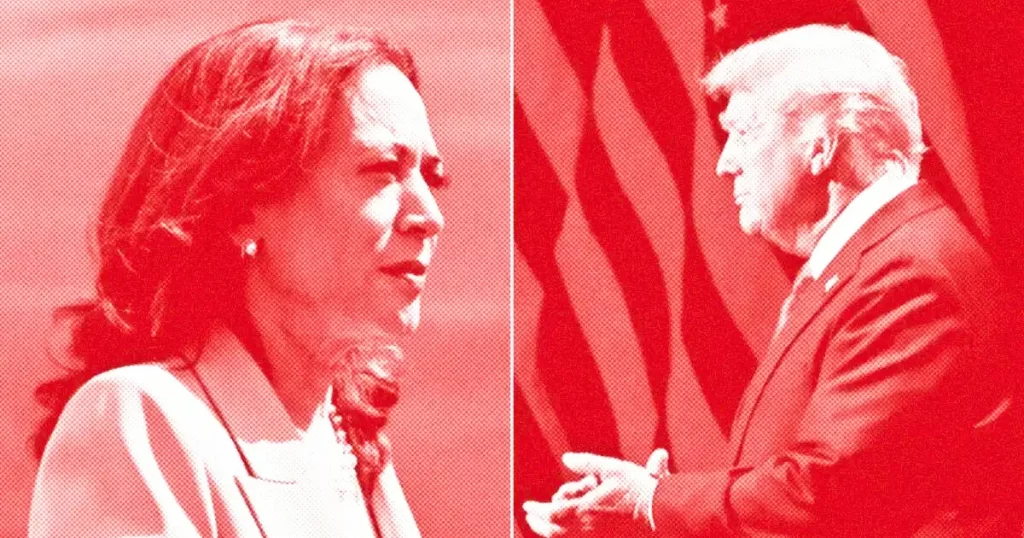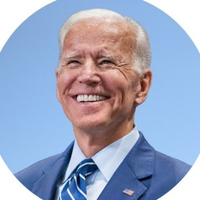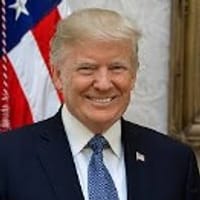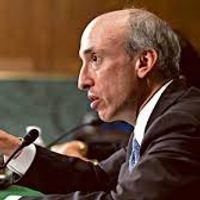ARTICLE AD BOX

The post Trump vs. Harris: Who Will Dominate the Crypto Scene in US Election 2024? appeared first on Coinpedia Fintech News
Do you know though the upcoming US presidential election is anticipated to be a battle between Democrats and Republicans, the actual fight is going to be between pro-crypto groups and anti-crypto groups? Along with the declaration of the election result, something else, more sensitive, will also be pronounced, ‘the destiny of the US cryptocurrency industry.’ The present US regime, led by Democratic leader joe biden

 joe biden
Joe Biden
President
was hostile towards the industry.
joe biden
Joe Biden
President
was hostile towards the industry.
It’s a well known fact. No crypto enthusiast may be able to forget or forgive the better regulatory crackdowns the United States SEC has launched in the recent past. At the beginning of the campaign itself, it was evident that the chances for Democrats to win crypto enthusiasts using the face of Biden were poor. Unsurprisingly Donald Trump

 Donald Trump
Donald Trump is an American former president politician, businessman, and media personality, who served as the 45th president of the U.S. between 2017 to 2021. Trump earned a Bachelor of science in economics from the University of Pennsylvania in 1968. Trump won the 2016 presidential election as the Republican Party nominee against Democratic Party nominee Hillary Clinton while losing the popular vote. As president, Trump ordered a travel ban on citizens from several Muslim-majority countries, diverted military funding toward building a wall on the U.S.–Mexico border, and implemented a family separation policy. Trump has remained a prominent figure in the Republican Party and is considered a likely candidate for the 2024 presidential election
President
emerged as a pro-crypto leader and gained the trust of a large section of crypto enthusiasts.
Donald Trump
Donald Trump is an American former president politician, businessman, and media personality, who served as the 45th president of the U.S. between 2017 to 2021. Trump earned a Bachelor of science in economics from the University of Pennsylvania in 1968. Trump won the 2016 presidential election as the Republican Party nominee against Democratic Party nominee Hillary Clinton while losing the popular vote. As president, Trump ordered a travel ban on citizens from several Muslim-majority countries, diverted military funding toward building a wall on the U.S.–Mexico border, and implemented a family separation policy. Trump has remained a prominent figure in the Republican Party and is considered a likely candidate for the 2024 presidential election
President
emerged as a pro-crypto leader and gained the trust of a large section of crypto enthusiasts.
Politics is unpredictable! Any miracle can happen! Such a miracle did happen during the present campaign as well. Joe Biden stepped aside, paving way for the emergence of Kamala Harris

 Kamala Harris
Kamala Harris is an American politician attorney, and currently serving as vice president of the United States. She is the first female vice president and the highest-ranking female politician in the U.S. Kamala was Born in Oakland, California, and graduated from Howard University with a degree in political science and economics, and later pursued her law degree from the University of California, Hastings College of the Law. As a politician, she implemented stricter laws, the DREAM Act, and federal legalization of cannabis, healthcare, and taxation reform. Harris secured enough non-binding support from delegates to become the speculative nominee of the Democratic Party.
Vice President
as the Democratic Presidential Candidate against Republican candidate Donald Trump. What it presented was a thin ray of hope for Democrats to win crypto enthusiasts. Not many consider Harris as a pro-crypto leader. It is impossible for her to deny responsibility to the actions done by the Biden administration, in which she is the second in command as the US Vice-President. For Harris, it will definitely be a tough task. At present, Harris finds herself at a crossroads, attempting to reconcile her government’s regulatory stance with the growing influence of the crypto community.
Kamala Harris
Kamala Harris is an American politician attorney, and currently serving as vice president of the United States. She is the first female vice president and the highest-ranking female politician in the U.S. Kamala was Born in Oakland, California, and graduated from Howard University with a degree in political science and economics, and later pursued her law degree from the University of California, Hastings College of the Law. As a politician, she implemented stricter laws, the DREAM Act, and federal legalization of cannabis, healthcare, and taxation reform. Harris secured enough non-binding support from delegates to become the speculative nominee of the Democratic Party.
Vice President
as the Democratic Presidential Candidate against Republican candidate Donald Trump. What it presented was a thin ray of hope for Democrats to win crypto enthusiasts. Not many consider Harris as a pro-crypto leader. It is impossible for her to deny responsibility to the actions done by the Biden administration, in which she is the second in command as the US Vice-President. For Harris, it will definitely be a tough task. At present, Harris finds herself at a crossroads, attempting to reconcile her government’s regulatory stance with the growing influence of the crypto community.
This report primarily checks whether Democrats have regained the confidence of the crypto industry or not.
Biden Administration’s Approach to the Crypto Industry
As mentioned in the introduction itself, there is no doubt that the US administration led by Joe Biden was, somewhat, hostile towards the crypto industry. The US Securities and Exchange Commission, led by Chairman gary gensler

 gary gensler
Gary Gensler is an enthusiastic leader and the current chair of the U.S. Securities and Exchange Commission (SEC). He has the extreme experience that spans wall street, government regulation, and an angel teaching about cryptocurrencies and blockchain at MIT. He announced several initiatives to enhance investor protections in the $2 trillion cryptocurrency market. He previously led the Biden-Harris transition’s federal reserve, Banking, and securities regulation agency review team.
He was awarded Treasury's highest honor, the Alexander Hamilton Award, and also was a recipient of the 2014 Frankel Fiduciary Prize. He was born on October 18, 1957, into a Jewish family, in Baltimore, Maryland. Graduated from the University of Pennsylvania, earning a Master's degree in Business Administration. Additionally, he is also a professor at the MIT Sloan School of management. He has served in various governmental roles since the 1990s, such as the treasury department, Sarbanes-Oxley, CFTC, Swaps, Enforcement, Libor investigation, Maryland Financial Consumer Protection Commission, Securities, and Exchange Commission.
Gary Gensler will probably keep on filling in as seat of the SEC until 2026, accepting his renunciation. He has expressed his desires to present crypto-related approach changes later on that include token commitments, decentralized finance, stablecoins, guardianship, exchange-traded resources, and advancing stages. A few officials as well as his kindred SEC magistrates have scrutinized Gensler for not giving adequate administrative direction on crypto, possibly prompting a standoff between Congress and the association.
The SEC, CFTC, and Financial Crimes Enforcement Network handle advanced resource guidelines in the U.S., however, each with various jurisdictional cases, bringing about an interwoven methodology that crypto firms should explore to work legitimately. Whether 2022 will see a more clear way for organizations in the crypto space is questionable, yet the cosmetics of the SEC's initiative will fundamentally change following the takeoff of chief Elad Roisman in the first month of the year. Chief Allison Lee's term is likewise set to terminate in June 2022.
Chairman
took an illiberal stand on cryptocurrencies. It considered cryptos as securities. Due to this stand, several top crypto companies like Binance and Coinbase have been forced to face tough legal battles.
gary gensler
Gary Gensler is an enthusiastic leader and the current chair of the U.S. Securities and Exchange Commission (SEC). He has the extreme experience that spans wall street, government regulation, and an angel teaching about cryptocurrencies and blockchain at MIT. He announced several initiatives to enhance investor protections in the $2 trillion cryptocurrency market. He previously led the Biden-Harris transition’s federal reserve, Banking, and securities regulation agency review team.
He was awarded Treasury's highest honor, the Alexander Hamilton Award, and also was a recipient of the 2014 Frankel Fiduciary Prize. He was born on October 18, 1957, into a Jewish family, in Baltimore, Maryland. Graduated from the University of Pennsylvania, earning a Master's degree in Business Administration. Additionally, he is also a professor at the MIT Sloan School of management. He has served in various governmental roles since the 1990s, such as the treasury department, Sarbanes-Oxley, CFTC, Swaps, Enforcement, Libor investigation, Maryland Financial Consumer Protection Commission, Securities, and Exchange Commission.
Gary Gensler will probably keep on filling in as seat of the SEC until 2026, accepting his renunciation. He has expressed his desires to present crypto-related approach changes later on that include token commitments, decentralized finance, stablecoins, guardianship, exchange-traded resources, and advancing stages. A few officials as well as his kindred SEC magistrates have scrutinized Gensler for not giving adequate administrative direction on crypto, possibly prompting a standoff between Congress and the association.
The SEC, CFTC, and Financial Crimes Enforcement Network handle advanced resource guidelines in the U.S., however, each with various jurisdictional cases, bringing about an interwoven methodology that crypto firms should explore to work legitimately. Whether 2022 will see a more clear way for organizations in the crypto space is questionable, yet the cosmetics of the SEC's initiative will fundamentally change following the takeoff of chief Elad Roisman in the first month of the year. Chief Allison Lee's term is likewise set to terminate in June 2022.
Chairman
took an illiberal stand on cryptocurrencies. It considered cryptos as securities. Due to this stand, several top crypto companies like Binance and Coinbase have been forced to face tough legal battles.
Safeguarding consumers and ensuring financial stability were the justifications provided for the hostile actions. The administration tried to develop a coordinated approach to cryptocurrency regulation in the form of initiatives like the Executive Order on Digital Assets issued in March 2022. But those attempts were inadequate to convince the crypto community that the administration’s stricter crypto policies would not hinder the growth of the industry. Actually, this discontent was a significant factor in shaping the political dynamics surrounding the crypto issue in the 2024 US election campaign.
The Republican Party’s Stand on Crypto
Sensibly speaking, what bothers Democrats is not the crypto community’s discontent towards the Biden administration, but is the Republican Party’s stand on the crypto industry. The prime opposition party has adopted a more pro-crypto stance in the US election campaign. It advocates for policies that promote innovation and minimize regulatory burdens. Republican candidate Donald Trump was formerly a vocal critic of cryptocurrencies. But things changed this time. Now, he is the most active crypto advocate in the entire political spectrum of the United States.
It took no time for him to convince his changed stand towards cryptos to cryptocurrency enthusiasts. He even promised to roll back the stringent regulations imposed during Biden’s presidency. His promises were received well, helping him to win the heart of the crypto community in the initial stage of the US election campaign. Some of these promises were revolutionary in nature. He opposed the creation of a Central Bank Digital Currency. He defended the right of Americans to mine and self-custody their digital assets. He even suggested appointing figures like Jamie Dimon to key positions in his administration. Until the stepping down of Joe Biden from the Republican candidature, Trump, due to his aggressive pro-crypto stand, enjoyed overwhelming support from the crypto community.
Is the Republican Party Winning the Crypto Sector?
At a point, especially before the stepping down of Biden, it was felt that the Republican camp almost completely succeeded in winning the crypto community and there was no hope for the Democratic camp to win back their lost crypto vote base. The promise of dismantling the regulatory framework established under Biden was so appealing that none of the efforts made by Democrats to control the erosion of their crypto vote base worked. Trump’s camp launched extreme efforts to reach crypto industry leaders. Naturally, his camp raised millions from industry donors. He participated in several high profile events like the Bitcoin Conference in Nashville.
But as we all know nothing is permanent in politics. Post the emergence of Kamala Harris as the Democratic Presidential Candidate, things changed slightly in favor of Democrats. At present, the crypto community is diverse. The promise of deregulation is appealing, but not to every member of the community. Some fear the over politicisation of the issue.
Many are against aligning too closely with any political party. The consistent attempt by Democrats to re-engage with the crypto community started to show positive results under the leadership of Harris.
The Democrats’ Crypto Strategy
Democrats, under Harris’ leadership, began to recalibrate its approach to digital assets. It was not easy for Harris, given the fact that a good number of Democrats support a more regulatory stance. Lately, the trend has changed slightly. Currently, there is a growing acknowledgment within the Democratic party ranks of the need to engage more constructively with the crypto community.
Recently, Harris’s camp tried to approach crypto leaders. Her campaign staff organized meetings with leading crypto firms like Coinbase and Ripple. But she knows any effort to appease the crypto community is inadequate if it does not reach the root of the community.
The establishment of the ‘Crypto4Harris’ group can be considered as such an effort to reach the root of the community. Interestingly, the group is not directly affiliated with Harris’ camp, but it supports her by advocating for policies that foster innovation while also addressing legitimate concerns about regulation. In that sense, what the group projects is a balanced approach – much better and liberal than what the Democratic Party has carried so far. The strategy, it seems, has worked well. The participation of Mark Cuban and Anthony Scaramucci in pro-Harris crypto events can be considered as a reflection of this success.
One big advantage the Democratic party has right now is. There is a feeling that the Democratic Party, especially its thinking about crypto, is changing. It is not because it adopted a pro-crypto stand in the election campaign, but because a good proportion of its elected members openly supported certain revolutionary crypto policies, discarding their party’s official stand of those policies. The recent passage of the Financial Innovation and Technology for the 21st Century Act with significant Democratic support is the finest example. Does it need any more evidence to assume that Democrats are genuinely willing to adopt revolutionary policies to accommodate the evolving landscape of the crypto industry.
US Democratic Candidate’s Efforts to Appease Crypto Enthusiasts
Harris’s camp has made several strategic moves. The prominent one is the addition of key crypto advisors to the team. What the team aims with the appointments is to gain valuable insights from their experience with major crypto firms. Such a strategy can help the team to shape a more nuanced approach to the complex crypto issue.
Organizing valuable meetings is also an important part of the Democratic strategy. Kamala Harris’s team organized meetings with industry leaders. The candidate participated in several panels focused on cryptocurrencies.
What is notable is how she positions herself in her party’s engagement with the crypto community. Clearly, it is evident that there is a plan from her side to present herself as a mediator to bridge the gap between the party and the community.
Her appearance as a corrective force, to an extent, enables her to distance herself from the wrongs done by the ruling regime, in which she is an important part.
The Importance of Crypto in the 2024 Election
As per the latest estimate, at least 40 million US voters own cryptocurrencies. What this implies is that the crypto community represents an influential vote base, which can never be ignored.
For the Democrats, winning over this vote base is important to countering the Republican Party’s narrative and securing voters from a younger, tech-savvy demographic – which were once a solid vote base of Democrats.
Endnote
In conclusion, the 2024 US Presidential Election is shaping up to be a critical moment for the future of cryptocurrency in the United States. While the Republican Party has made significant strides in winning over the crypto community, the Democratic Party, under Kamala Harris’ leadership, is not far behind. By calibrating its approach and engaging more constructively with the industry, the Democrats are working to regain the trust and support of crypto enthusiasts. As the election draws nearer, the strategies employed by both parties will play a crucial role in determining the direction of crypto regulation and innovation in the years to come.
Also Check Out: MicroStrategy’s Bitcoin Holdings: Unraveling a High-Stakes Investment Strategy
.png)
 4 months ago
3
4 months ago
3













 English (US)
English (US)